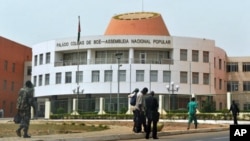Soldiers in Guinea-Bissau have seized control of the capital just hours before campaigning was set to begin for a presidential run-off election. Sources say soldiers grabbed the interim president and the frontrunner presidential candidate, though the two men's whereabouts are unknown. Residents say a tense calm has returned to the capital. However deep divisions within the military mean further unrest is still a possibility.
Soldiers in Guinea-Bissau say they seized power late Thursday to prevent Angolan forces from attacking the nation's military.
The Military Command, as the still unidentified coup leaders are calling themselves, released a written statement Friday. In it, they said they were in possession of a "secret document" which they allege authorizes a foreign military intervention that had been signed by Prime Minister Carlos Gomes Junior and the interim President Raimundo Pereira.
Soldiers attacked Gomes' house Thursday night after they reportedly took Pereira into custody.
VOA's reporter in Bissau, Lassana Cassama, says a relative calm has returned to the capital Friday; however, soldiers are heavily deployed on the main roads downtown. The coup has not garnered much popular support, he says, but many residents are afraid to speak publicly, or even leave their homes.
The Military Command is calling on the population to refrain from looting, vandalism or other disruptions to public order after a night of gun and mortar fire.
Soldiers seized TV and radio stations, Gomes' party headquarters and the downtown area. Electricity was cut, and residents, fearful of violence, huddled indoors.
Guinea-Bissau was set to hold a presidential run-off election on April 29.
Gomes emerged as the front-runner after the first round on March 18. He won 49 percent of the vote - just shy of the majority needed to avoid a run-off.
The Africa director at London-based think tank Chatham House, Alex Vines, said Gomes is seen as the so-called "candidate of Angola," which has been involved in military reform efforts in Guinea-Bissau.
"This has created problems inside Guinea-Bissau," he said. "There have been over recent months increasingly hostile media commentary and sniping of the Angolans that they are partisan, that they are not even-handed. That is the backstory to these allegations that the Angolans are supporting Mr. Gomes."
Just days before the coup, Angola had announced that it was pulling out a $30-million security sector reform mission to Guinea-Bissau.
Gomes has also pledged to overhaul the nation's large and unruly armed forces, as well as fight rampant drug trafficking on the nation's Atlantic coast.
Vines says many in the military did not want him to win.
"There are parts of the military that don't want reform," he said. "The reform of the Bissau military is an absolutely essential part of stabilizing the country and many have failed previously."
Gomes was to face ex-president, Kumba Yala, in the run-off election. However, Yala had refused to participate in the second round after alleging that the first round was rigged.
Yala held a press conference Thursday just hours before the coup took place. He warned of "consequences" for anyone who tried to campaign.
Yala has strong ties to the military, which is dominated by his Balanta ethnic group. The former president had been overthrown by a coup in 2003 after just three tumultuous years in power.
Fierce rivalries between military and political leaders in Guinea Bissau have sparked repeated coups, mutinies and assassinations, as well as a civil war in the late 1990s. No elected president has finished his mandate since 1994.
Former president Malam Bacai Sanha died in January following a prolonged illness after just two years in power.
Regional bloc ECOWAS has condemned the apparent coup that comes just weeks after soldiers in Mali overthrew that country's democratically elected president.
News
Soldiers Seize Power in Guinea-Bissau, Disrupt Election




